Escobar: If you have strong economy, you will keep people here, and Serbia is ready to be economic leader
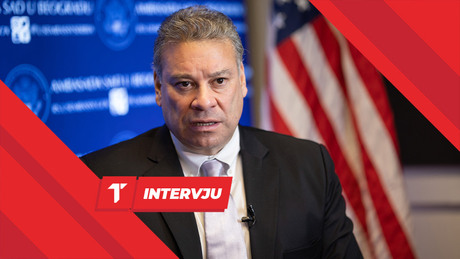
Gabriel Escobar, US Deputy Assistant Secretary of State and Special Envoy of for the Western Balkans, is currently visiting Serbia, ahead of a new meeting between Serbian President Aleksandar Vucic and Albin Kurti in Ohrid on March 18.
Escobar spoke to Telegraf.rs primarily about the economic prospects of the Western Balkans and Serbia, which he says are excellent, and then about the meeting with Vucic and the continuation of the dialogue in Ohrid.
- Mr. Escobar, let me first thank you for everything you are doing for Serbia and for the region. We are closely following your statements, and most recently you talked about the economic benefits for the whole region. What are the short term and long term possible economic benefits from regional integration here in the Western Balkans? What are the main advantages that economic connectivity provides here?
I'll start with the very easy one. I've always said that the Western Balkans is an area of tremendous economic opportunity. Yet the image of the Western Balkans, when you leave the region, is one of political turmoil, one of political problems. In fact, it's not the case. When you come here you realize what a vibrant and incredible European region it is. You are part of the European family, you're not part of the formal structures, but you are very much a contributing part of Europe. So a normalization agreement, a peace agreement, between Serbia and Kosovo, would go a long way into convincing people, or at least help them understand, the true potential of this region.
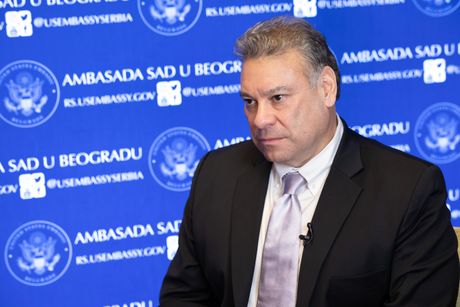
- You first came here in 2001 if I'm not mistaken. How do you see the changes, then and now?
I actually came here in 2000 the first time, but I started in Bosnia and Herzegovina, I started in Banja Luka. And since then what I've seen is all of the region transformed in a very positive way. Through construction, through investment, through greater penetration of the region by international companies, most of whom are staffed by local people. So what I've seen is that the European Union, the United States and the world have discovered the Western Balkans, discovered the potential of the region as contributing economic members. If you look at the history of the United States and of Europe, the people of the Western Balkans have helped build both sides. So I think that with a renewed emphasis on the economy, we can see the people of the Western Balkans finally building the Western Balkans.
- So you think we have some reason for optimism in the next 30 years, since our last 30 years have been plagued by crises, sanctions, wars, etc.
Yes. Anybody who looks at the region can only conclude that you've gone in the right direction. So, this will give you even more opportunities to integrate into the European Union. But if you look at the economy, the economy of the Western Balkans, 70% of it is dependent on the European market. Of what's left of the 30%, almost all of it is regional, with some parts being investments from the Unites States, China, Turkey, the Middle East. But the reality is, almost all of your economy is regional, and European. This helps you move faster in both directions.
- The Serbian economy has shown itself as a tough cookie in the time of instability since the war in Ukraine broke out and we received important messages and praise from the World Bank and the IMF. What is your assessment of our economy?
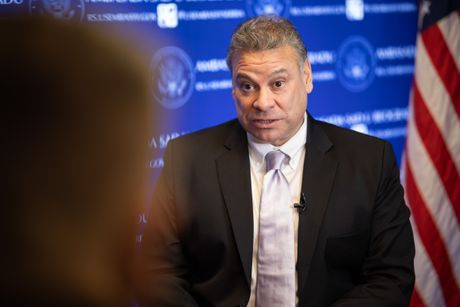
I agree with that. I think it's a strong economy, it's a dynamic economy. It's one that is poised to be a leader in IT, shipping, transportation, renewable energy, and yet, you could still do better. You could still do better by helping increase the supply chains and increase the supply chains in the region which is another reason why I always say that the best solution is for all of the countries of the region to recognize each other and to be recognized by all of the European Union. So, you do better through integration that you do individually. So this is another selling point.
- What about the investors? How do they see the political situation in the region? Are they afraid still of investing here?
I think part of it is, they get more predictability when they know what your regulatory and legislative path is. So that path has to be harmonization with the big European market. I'll give you an example. During Covid, when the vaccines were coming out, to do a trial and a licensing agreement with the European Union and get access to 400 million people was more of a priority than to come and do it individually in the countries of the Balkans that are sometimes as small as two million. So, by giving the world the confidence that you're moving to align your regulation and your legislation with the European market, and that the European market is increasingly open to you from their side gives investors more confidence that they are getting a good deal. So it is important that you continue the path to both integration and normalization with Kosovo.
- This goes of course for the EU investors and eastern investors. How about the US, how do you see the economic cooperation with Serbia, in the time to come?
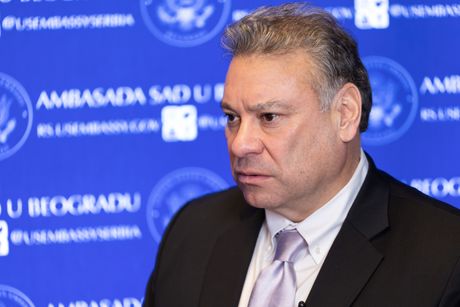
I can only see it as growing. Now, I have to be very clear that a lot of American investment is coming through Europe. So as you align with Europe you're going to see more American companies that are based in Europe increasingly expand their reach into the Western Balkans. So by doing the things you need to enter the European Union, you're also improving the relationship with the United States, economically.
- One problem we have here is the labor force, that is, the lack of qualified workers, in the region, not only in Serbia. How can the integration of the region help create a solution to this challenge?
Most of the people who are leaving, most of the qualified people, are leaving because they have options. Their options are greater in a bigger market. So, by integrating into that market you're creating opportunities for people to stay, in fact you're creating opportunities for people to return. So when this market starts to take off, and it is taking off, it's already growing, Serbia's growing, depending on the year, depending on the estimate, up to 7-7.5%. That's five times greater than Italy. You're going to start seeing people come back. So that is the ultimate goal of integration, the economics, and it is the demographics.
- The prerequisite for all of this is, as we know, political stabilization. You spoke with President Vucic yesterday are you satisfied with what you heard? What are you expectations from the Ohrid meeting on March 18?
In my discussions with Vucic, we always talk about the economy, because the economy is going to determine the future. And the economy is going to determine the demographics of this country. If you have a strong economy you are going to keep the people here. If you don't, you're not. And if you have any challenges to your economy, including political instability, especially political instability, they you're going to have a challenge both on the economy and the demographics. So our expectation, coming out of Ohrid, is that the two sides recognize that they need to be fully engaged in a normalization process. And that process needs to have a common understanding of what's required. What is required of Kosovo, and what is required of Serbia, and a timeline of when they are going to implement their sides.
- One of the points that was the point of disagreement is surely the association of Serb municipalities. Is Kurti ready to accept this? You said that it must happen in a way that is a "win-win" situation for both parties. How can this be done? How can it be "win-win"? How can both sides be winners?
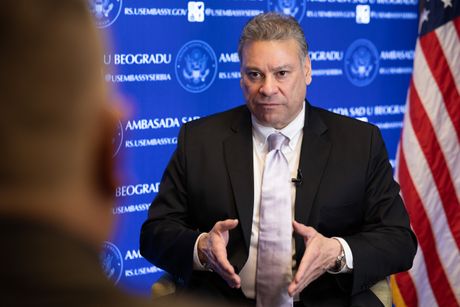
I'll give you one example. This is not about Kurti. Kosovo has signed up to this agreement so the government of Kosovo is legally obligated to implement it. It is an existing, outstanding, international legal obligation. That's the way we see it. It appears in the Brussels agreement, it appears in this agreement, it is in the conclusions of the European Council, it is in our policy. So, it is going to happen. The question is, which government of Kosovo is going to implement it. So, the sooner the better. And in reality what it does is recognize that people who are in the Serb minority in Kosovo are citizens of both Serbia and Kosovo. They're entitled to participate, like and dual citizen, in the cultural, economic, political, and every other kind of life in Serbia, but yet entitled fully to the full protection of the institutions of Kosovo. So in the North in particular, what this association could do, is not only open the door to greater civic engagement by Serbs in Kosovo, but also be the bridge between Serbia and Kosovo, and potentially, between three, or four, or five or even six countries in an economic union, whether its Open Balkan, the new Berlin Process, or common regional market. They are strategically placed. So, it can be a win for both sides, by opening economic doors to both countries.
- One last question. When the smoke clears, do you think Kurti will be a part of one winning side, formally? Is he going to be there? Because you told us before that either he's going to be there and sign it, he'll be in power, or he won't. It will be somebody else.
Look, I'm not trying to make a comment about internal politics, but the fact is, Kosovo is obligated to do the association. And so the question is how, and who, and what. So, I don't mean to make it a challenge for Prime Minister Kurti, it's just a fact, that everyone is expecting and urging, and promising to work with the government of Kosovo. It's just a fact.
(Igor Cuzovic/Telegraf.rs)
Video: Film "Biće novih leta“ Gvozdena Đurića premijerno prikazan u Beogradu
Telegraf.rs zadržava sva prava nad sadržajem. Za preuzimanje sadržaja pogledajte uputstva na stranici Uslovi korišćenja.

